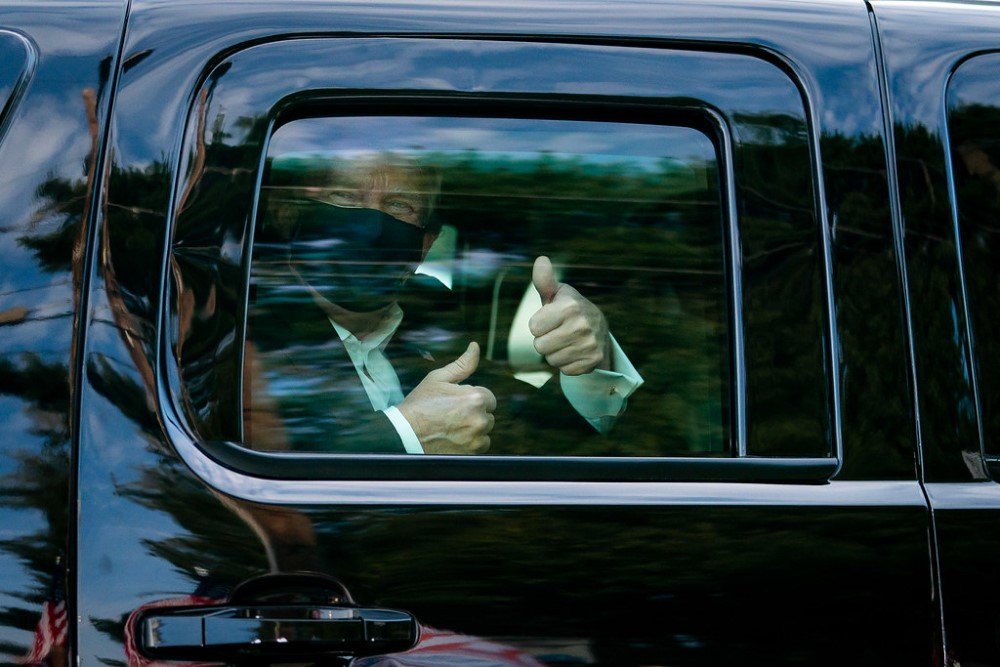When I first heard that President Donald Trump tested positive for COVID, I began following the regular updates about his condition. I read through the updates from his doctor, I checked the dates on his previous COVID tests to determine when he was probably infected, I cross-referenced the results of his medical tests with what actuarial data exists for COVID cases, and I regularly checked in to see if President Trump’s condition was improving or worsening.
Or, more precisely, those were all things I wanted to do. Why didn’t I do them? Because the White House did not release detailed medical information. We got some minimal updates about the president’s conditions, but those updates were devoid of specifics and often inconsistent. This bothered me, and I immediately added this to the tally of ways the Trump administration has been insufficiently transparent.
I was upset with the White House, I felt they were doing something wrong by not being more transparent. I felt like I had a right to know about my president’s health condition! Not only that, I felt I had a right to know about the health condition of a current presidential candidate less than a month from the election. I felt that President Trump, as both the sitting president and a presidential candidate, did something wrong by not releasing details of his condition to the public.
But is my feeling that the president had such an obligation of transparency correct? There is an extensive academic discussion of this very question. To what extent do candidates retain rights to medical privacy, and to what extent does the public gain a sort of moral right to medical transparency? That is the question I want to consider here.
Normally people do not have an obligation to disclose private medical information. That is true even if that information is materially significant to others. Certain illnesses could perhaps compromise my ability to teach at FSU — FSU thus has a real interest in knowing the results of my medical tests. That does not mean I have an obligation to send FSU that information. If I decide I can no longer do my job, then I should let FSU know and possibly I should resign. But if I think I can continue my work, FSU does not have some right to the same medical information so that they can make their own determination. My interest in medical privacy supersedes their interest in my medical history. FSU can fire me if the quality of my work suffers. But they don’t have a right to my medical information so that they can preemptively decide if they think my work will suffer.
Now, there are limits to our medical privacy. If diagnosed with HIV, one ought to disclose that diagnosis to prior sexual partners. Similarly, in cases of medical emergency, the state might need to violate medical privacy to prevent the spread of a highly infectious disease. Even in those cases, however, it is still reasonable to maintain as much privacy as possible. Following a COVID diagnosis, you might be justified in telling people I’ve been around that they may have been exposed to COVID-19. But that would not justify you telling others whether or not I was given supplemental oxygen.
So what explains my intuition that the president should release the details of his medical tests and treatment? It is something about the difference between me and the president. The first difference that comes to mind is how much more important the president’s work is. President Trump’s decisions are more influential. As such, perhaps there is a large enough public interest to override claims to privacy.
That explanation does not quite capture my moral intuitions though. I don’t just intuit that President Trump has an obligation of transparency, I also intuit that the President of Malta has an obligation of transparency to the people of Malta. I don’t, however, intuit that Jeff Bezos has an obligation of transparency, even though Jeff Bezos almost certainly has far more power and influence than the President of Malta.
So if President Trump has a special obligation of medical transparency, that must be because of his governmental role. It is not that President Trump is more powerful than I am, but that President Trump can act with the coercive force of law. Put another way, President Trump is actually two persons. He is the private person of Donald Trump and also the public person of the President of the United States. President Trump can act as a private person, such as when he gives his children Christmas presents or writes personal letters to friends. President Trump can also act as a public person, such as when he signs laws or writes letters to foreign dignitaries on behalf of the United States. Indeed, it is precisely my distinguishing these two persons that we can make sense of concepts like political corruption. An act is corrupt when a politician uses their public function for a private purpose.
And indeed, we do think that President Trump retains privacy interests over his personal letters in a way he does not over letters he writes as the head of state. So, perhaps in the private person of Donald Trump deciding to run for the President of the United States, he forfeits certain privacy interests due to the demands of public transparency that a democratic electorate have over the head of the executive. Perhaps because the government acts with the consent of the governed, informed consent implies the public has special rights to know.
This seems like the strongest case for why President Trump, unlike myself, might have special obligations of medical transparency. There is, however, a powerful argument against norms of medical transparency. One of the interests we have in medical confidentiality is that it encourages people to seek out healthcare. If I know my doctor will keep a, potentially damaging, diagnosis secret, then I am more likely to go to the doctor. Presidents are political creatures; they need to factor in public reactions to what they do. Thus, a politically savvy politician might well be unwilling to undergo certain medical tests if they know there is a norm of disclosure. And this might be especially concerning for someone in a position as important as the President of the United States. The medical ethicist George Annas has argued that in general “we should encourage our leaders to seek such help whenever they feel they need it, both for their own sakes and for ours, and protecting their medical privacy is essential if this is to happen.” If presidents were morally required to disclose consultations with a psychiatrist, then presidents will be much less likely to consult them. Having the ‘leader of the free world’ unwilling to consult with medical professionals, however, is a scary place to be. We don’t want a president refusing needed supplemental oxygen just because they fear the consequent political blowback. The best way we know to prevent that, however, is maintain strong norms of medical privacy.
It seems reasonable to think that one might forfeit a deontological right to medical privacy by running for president. But it also seems reasonable to think that there are independent reasons to maintain norms of medical privacy that go beyond merely personal rights.
Oh, and a quick postscript for those readers who have never watched The West Wing. It is a great show, and the third season largely deals with questions of medical privacy and the public’s right to know.


